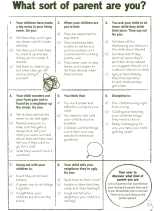If you're a frequent visitor to Healthify, why not share our site with a friend? Don't forget you can also browse Healthify without using your phone data.
Parenting styles
Key points about parenting styles
- Parenting styles describe the different strategies, behaviours and environments parents use to raise their children.
- There’s no one way to parent and no parent is perfect.
- There are 3 main parenting styles – it’s normal to use a mix of them, especially in different situations.
- Thinking about your style of parenting and making changes if needed is called conscious parenting.
- It’s okay to ask for help – parenting is hard and we all need support at times.

A parenting style is the collection of strategies you use when you're raising your children, based on your own behaviours and attitudes to parenting. It’s the way you interact with your children and the kind of emotional environment you create for them. Different approaches to parenting can be influenced by values, personality, culture, and how your parents or caregivers raised you.
All children are different and will develop in their own way – even siblings who have been raised in the same family together can turn out to be very different people! However, research suggests that parenting styles still have a big impact on a child’s development, and even how they might cope with and approach life when they’re older.
Different parenting styles can affect children’s mental health and wellbeing, self-esteem, how well they do in school, and how they relate to others and form relationships.
Parents are the single most important influence in a child’s life, and it’s a hard job! No-one does it perfectly. Learning more about parenting styles is a good way to support your own parenting as you raise your tamariki.

Image credit: Canva
There are 3 main parenting styles. Most parents use a mix of these – sometimes being stricter when they’re stressed, or more easy-going when they’re tired. You might have one you use most often.
Cultural factors also play a part in different parenting styles and how children develop and learn. There isn't a ‘one size fits all’ approach to parenting.
Authoritarian style (the rock)
This style is strict and inflexible. Parents expect children to follow rules without questioning, and mistakes often lead to punishment. Children raised this way can feel anxious, less confident and might struggle with independence. They might reject their parents and their values as they become teenagers.
Permissive style (the paper)
These parents set loose boundaries and often give in to their children to keep the peace. They try to protect their kids from anything hard or upsetting – sometimes called ‘helicopter parenting’. Children can become less able to cope with challenges, rely too much on others and struggle to solve problems on their own. Parents might take this approach because they want their tamariki to have a happier childhood than they did – if their parents were authoritarian (strict).
Authoritative/supportive style (the tree)
This approach is firm but fair. Parents set clear limits but also listen to their children and adjust as needed. They encourage, praise, explain rules – and have reasonable consequences if that’s not what happens. Tamariki raised in this way are usually confident, motivated, and respectful of others.
Most parents use a mixture of all 3 styles, depending on how they’re feeling.
Some experts now add a fourth style:
Neglectful or uninvolved parenting
Uninvolved parenting is when parents give their child the basics, such as food and shelter, but aren’t very involved in their life. They don’t set many rules, don’t offer much support or guidance and usually don’t talk much with their child. These parents may seem distant or uninterested, and sometimes even ignore or neglect their child’s needs. Tamariki with uninvolved parents can find it harder to do well at school, manage their emotions, or make friends. They may also feel anxious or depressed and have trouble with self-control and self-confidence.
All parenting styles have strengths and weaknesses, but the style that experts agree is most effective is the authoritative and supportive style (the ‘tree'). Children thrive when they have lots of love and support combined with clear boundaries and guidelines. This style allows for flexibility when needed but is consistent overall on the important things – supporting children in becoming secure, confident and capable.
Tips for a firm and fair approach to parenting
- Give lots of love and positive attention – be your child’s safe place.
- Know what’s normal for their age and keep your expectations realistic.
- Spend quality time together, even just a few minutes a day.
- Praise good behaviour and notice them trying hard or doing well.
- Have routines but be flexible on tough days, or when things don’t go to plan.
- Give clear warnings and keep children informed about what’s happening next.
- Offer simple choices to help build confidence.
- Stick to a few clear, fair rules – don’t overwhelm with too many.
- Use consequences that are reasonable and connected to the behaviour.
- Adapt your approach for each child – they’re all different.
- Role model the behaviour you want to see – our tamariki learn by example.

Image credit: Canva
Parenting isn’t always a walk in the park. It’s easy to get caught up in the busyness without pausing to think about how you’re actually parenting. Many parents and caregivers also parent the way they were parented – good and bad – without realising they’re doing it.
Conscious parenting is about being thoughtful and aware of how you parent. Instead of just reacting to your child’s behaviour, you pay attention to your own feelings, habits and expectations. It’s being intentional in thinking about your style of parenting and making changes if and where needed.
Conscious parenting in action:
- Try to understand where your reactions come from and focus on building a closer, more positive relationship with your child.
- Instead of punishing or trying to ‘fix’ your child, notice what led to any problems and think about the bigger picture.
- Practice letting go of old patterns or ‘baggage’ from your own family or childhood, so you can give your child space to be themselves.
- Communicate respectfully and spend time really listening.
Most of us bring lifelong habits and set ways to parenting. While changing can take time, practising conscious parenting can lower stress and help you feel calmer. It also encourages healthy conversations, kindness and problem-solving between parents and children.
Parenting styles(external link) Plunket, NZ
Parenting styles and the one you want to aim for(external link) Parenting Place, NZ
Quiz – what’s your parenting style?(external link) Verywell Mind, US
Parenting tips preschoolers (3 to 5 Years)(external link) Parent Help, NZ
Parenting tips school age (6 to 12 Years)(external link) Parent Help, NZ
Do you know your parenting style?(external link) Parent Help, NZ
Apps
Brochures
What sort of parent are you?(external link) Tākai, NZ
Mātuatanga – thinking about parenting(external link) Tākai, NZ
References
- Parenting styles(external link) Plunket, NZ, 2025
- Parenting styles and the one you want to aim for(external link) Parenting Place, NZ
- Why parenting styles matter when raising children(external link) Verywell Mind, US, 2025
- What is conscious parenting and should you try it?(external link) Healthline, US, 2020
What are the main parenting styles?
The 3 main parenting styles are:
· Authoritarian: Strict and firm, with high expectations and rules – parents expect children to obey without question and often use punishment for discipline. Children raised this way may be obedient but can be less confident and struggle with decision-making.
· Permissive: Gentle and warm but set few boundaries or rules – these parents avoid conflict and might let their children do what they want. Tamariki with permissive parents might struggle with self-control and the ability to cope with challenges.
· Authoritative: Firm but fair – these parents listen, explain decisions, and encourage independence while setting limits. Children raised this way tend to be confident, motivated and respectful toward others.
A fourth, emerging style is neglectful or uninvolved parenting – when parents give their child the basics like food and shelter but aren’t very involved in their life.
What parenting style am I?
To understand your parenting style, take Takai’s parenting style quiz [PDF, 4.6 MB] or try this one on Verywell Mind(external link).
Which parenting style is best?
Most experts agree that the authoritative (supportive) style – described as the ‘tree’ – is the most effective parenting style. This approach is firm but fair. Parents set clear rules and boundaries, listen to their children’s needs, give lots of encouragement, and adjust their approach as tamariki grow. This balanced approach is recommended because it best supports children’s healthy development.
Brochures

Tākai parenting style quiz
Tākai, NZ

Mātuatanga: Thinking about parenting
Tākai, NZ
Credits: Healthify editorial team. Healthify is brought to you by Health Navigator Charitable Trust.
Last reviewed:





